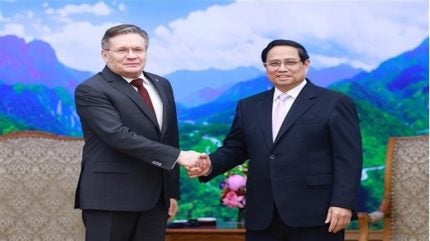
Russia and Vietnam signed a memorandum of understanding on developing nuclear energy cooperation during a two-day visit by the Russian Prime Minister Mikhail Mishustin to Hanoi for talks with Vietnamese Prime Minister Pham Minh Chinh. A statement by the Russian government said the memorandum between Rosatom and Hanoi’s state power company Electricity of Vietnam (EVN) is one of seven documents signed during the visit.
During a meeting prior to the signing of the documents, Mishustin described Vietnam as an important partner of Russia in Southeast Asia. He added that bilateral cooperation in the energy sector plays a strategic role, and that that there were good opportunities to expand cooperation in the field of nuclear energy. In June 2024, Russia and Vietnam signed 15 documents aimed at expanding bilateral cooperation following a meeting between Russian President Vladimir Putin and To Lam, who was then president.
Vietnam began considering nuclear power generation in 1995, and firm proposals were developed in 2006, for the construction of two NPPs in Ninh Thuan province with a combined capacity of 4,000 MWe. megawatts. The Ninh Thuận 1 NPP project was a collaboration with Russia, which had completed and handed over the site approval documents and the English version of the feasibility study report at the end of December 2013. The Ninh Thuận 2 NPP project was a joint effort with Japan, which had completed and handed over the site approval documents and feasibility study report in 2014.
In 2016, these plans were cancelled due to economic difficulties and safety concerns. Currently, the only nuclear reactor in Vietnam is a 500 kWt research reactor in Dalat, which was built with Rosatom’s assistance in the early 1980s.
Prime Minister Pham Minh Chinh also held talks with Rosatom Director General Alexey Likhachev. Pham said Vietnam values the Comprehensive Strategic Partnership with Russia, in which energy cooperation for peaceful purposes and space research are highly potential sectors. He added that he appreciates Russia’s support for Vietnam in training scientists and experts in the field of nuclear energy, designing and operating the Da Lat Nuclear Reactor, developing the Vietnam-Russia Tropical Centre, and supplying radioactive pharmaceuticals for cancer diagnosis and treatment.
Likhachev said Rosatom would continue strengthening cooperation with Vietnam and stands ready to assist Vietnam in building nuclear power plants, establishing a new, modern nuclear centre, transferring technology, localising nuclear products, and developing nuclear science and industry, with a long-term vision spanning hundreds of years.
The visit came the day after the Vietnamese government announced establishment of a steering committee for a proposed nuclear power plant construction project in the Ninh Thuan region, led by the prime minister with the remit to “direct amendments and supplementation to legal regulations for nuclear power development; direct the research and development of the nuclear power programme and submit to competent authorities for consideration and approval; direct international cooperation with other countries, international organisations and the International Atomic Energy Agency in nuclear power development”.
This followed decisions in November by the National Assembly and the Central Committee of the Communist Party of Vietnam to give their backing to new nuclear. EVN “has been assigned by the government to be the investor of the project”, according to the statement announcing the formation of the steering committee.
Alexei Likhachev told reporters that it had been decided to create a new research reactor of Russian design for Vietnam, with construction planned to begin in 2027. “The extension of the Dal At reactor is possible as a result of our modernisation somewhere up to ten years. This means that in the near future, Vietnam needs to create a new modern, more powerful research reactor. And such a decision was made – to create a Russian design reactor with a capacity of 15 MWt.”
He added that a feasibility study was underway, a contract has been drawn up, work had begun. “Well, we are moving in accordance with the schedule that our Vietnamese friends determined for us – in 2026 to sign the contract, and in 2027 to begin full-scale construction of a new research reactor.”






